UPDATED at 5:40 p.m. ET on 2024-01-07
Prime Minister Sheikh Hasina and her Awami League party will return to power for an unprecedented fourth consecutive term in Bangladesh after being declared the winner of Sunday’s general election, which drew a low turnout amid an opposition boycott.
Early Monday (local time), preliminary results released by the Election Commission showed the Awami League had won at least 222 out of 300 parliamentary seats, enough to form a super majority and again govern the South Asian nation of 170 million people.
With more than 294 seats declared, the Jatiya Party – an ally of the ruling party and the only other notable party contesting the election – won only 11, while independent candidates aligned with the Awami League secured victories in 61 parliamentary constituencies.
The result effectively rubber-stamped an outcome that had been predicted long before, after the main opposition Bangladesh Nationalist Party (BNP) and its allies declared they were boycotting the country’s 12th general election. Thiers was an act of protest against Hasina’s refusal to give in to their demand that she step aside to allow a neutral caretaker administration to oversee the election.
Polling centers closed at 4 p.m. Sunday, and BenarNews reporters visiting voting sites observed a slow trickle of voters, with ruling party activists standing guard outside.
“The election result was a formality; we all knew what was coming. The big question now is how a supercharged political environment is impacted,” Michael Kugelman, director of the South Asia Institute at Wilson Center in Washington, told BenarNews.
“Reconciliation seems unlikely given the current climate, but concessions – such as the release from jail of some BNP leaders – could help reduce tensions.”
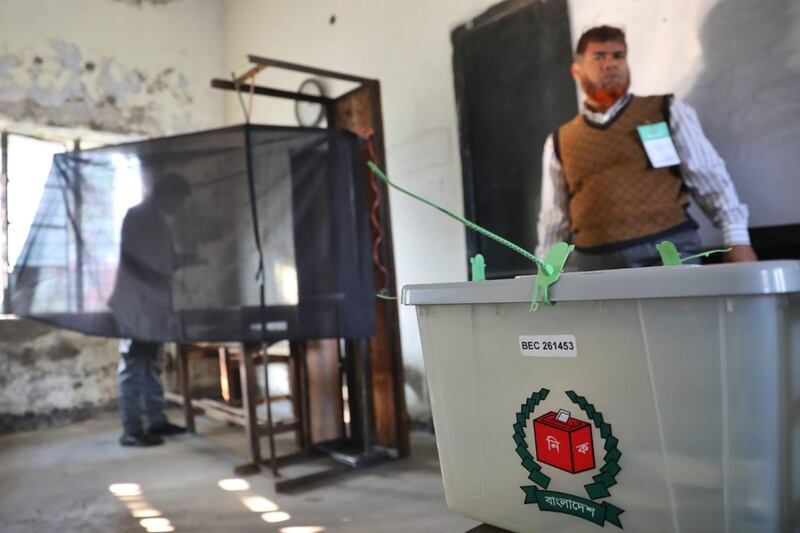
Meanwhile, there was confusion about the actual turnout rate when Chief Election Commissioner Kazi Habibul Awal announced at a post-poll press conference that it was “about 28 percent” – only to be quickly corrected on the spot by his own officials.
The initial estimate of 28% was in line with another announcement that the turnout was 27% an hour before the polls closed. However, after being corrected, a visibly confused Awal said the estimated turnout would be 40%.
“This 40 percent is reliable,” he said.
Meanwhile, Netra News, a Sweden-based news outlet focusing on Bangladesh, claimed to have obtained videos of the real-time dashboard screens from the Election Commission hours after polls closed, showing that the turnout rate was indeed about 28%.
However, the BNP and other parties have criticized the preliminary turnout figure of 40%, calling it a “sham.”
In the 2018 election, where the BNP participated, voter turnout exceeded 80%. Ruling party officials had earlier suggested that a high turnout rate would dispel criticisms about the election being rendered a pointless exercise due to the BNP’s boycott.
The BNP, which had called for nationwide strikes over the weekend, previously stated that the opposition boycott had succeeded.
In a social media post, Tarique Rahman, thede facto leader of the BNP, thanked the public for “securing a victory without even participating in the sham election.”
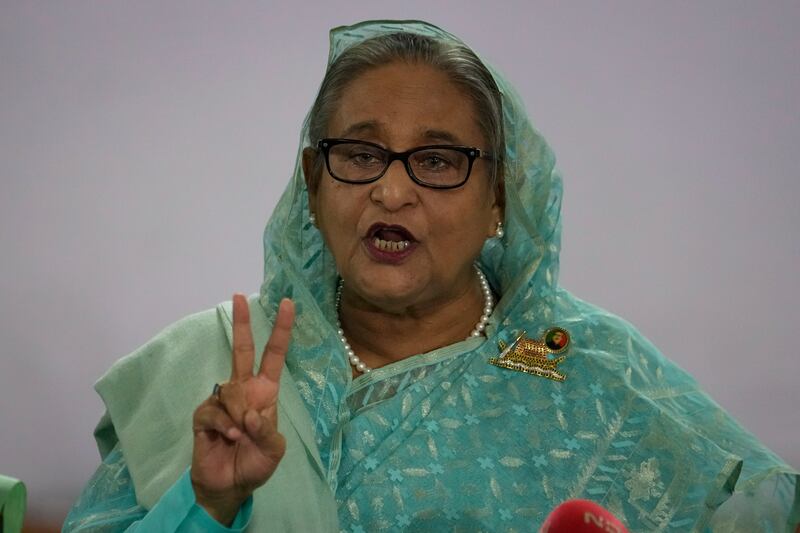
In the Gopalganj-3 constituency, Sheikh Hasina won by securing about 250,000 votes, more than 86% of the total eligible voters. Her nearest rival got only 460.
In several polling centers where Hasina was a candidate, the turnout rate was an improbable 99-100%.
Even in an election where the ruling party was poised to retain power, instances of ballot stuffing were not uncommon. According to a BenarNews review of local reports, authorities arrested individuals or suspended polling officials for aiding ballot stuffing in at least 12 districts.
Hasina, 76, cast her ballot at Dhaka City College Center in the capital as soon as polls opened at 8 a.m.
“Your vote is very valuable,” she said after voting, accompanied by her daughter and sister. “We fought a lot for the right to vote, and I hope that all the people of the country will come to vote at the polling centers. Bangladesh will continue its democratic trend.”
Scattered incidents of violence were reported across the country on Sunday.
Police said Zillur Rahman, a 40-year-old supporter of the Awami League, was killed by supporters of a rival independent candidate outside a polling center in Mirkadim municipality, south of Dhaka. Another man, Nawab Al, 60, reportedly died in a scuffle outside a voting station in Debidwar, Comilla district.
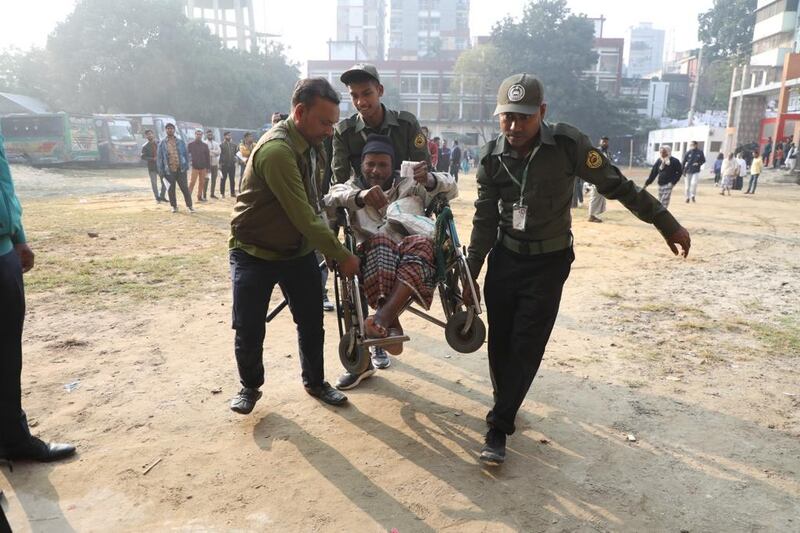
Elsewhere, three people were injured by a homemade bomb detonated at a polling center in the Dhaka neighborhood of Hazaribagh, said Bachchu Mia, a police official.
Some 800,000 police and armed forces personnel have been deployed to safeguard law and order for the general election.
On Saturday, the eve of the vote, readers found the websites of several news outlets, including Daily Manab Zamin, Samakal, and Voice of America, inaccessible. Digital rights activists told a BenarNews reporter that the websites appeared to have been blocked by authorities.
‘Sacrificial lamb’
The Jatiya Party, aligned with the government and the only other competitor in the election, won just 11 seats – fewer than half of the 23 seats it had held. The victories were out of the 26 seats where the Awami League withdrew its official candidates to support Jatiya. However, independent candidates, also linked to the Awami League, remained in the race for those seats.
Earlier, almost all of the Jatiya candidates outside the 26 seats withdrew their candidacies, alleging unfair elections.
“We feared being used as a sacrificial lamb to legitimize what would be a one-party system,” G.M. Quader, the embittered leader of the Jatiya Party, told reporters. “Despite assurances, the Awami League repeated its old strategy of manipulating elections by taking over polling stations forcibly.”
To create the appearance of competition in the polls after the opposition’s boycott, the Awami League allowed its members to run as independents if they weren’t formally nominated.
In most cases, these independents served as mere placeholders to save the ruling party from the embarrassment of its official candidates winning without even any token rival. However, in other areas, some independent candidates demonstrated a stronger presence.
The parliamentary election, which is the 12th since Bangladesh fought a bloody war for independence from Pakistan in 1971, had been overshadowed by political unrest and mass arrests in the run-up to the vote.
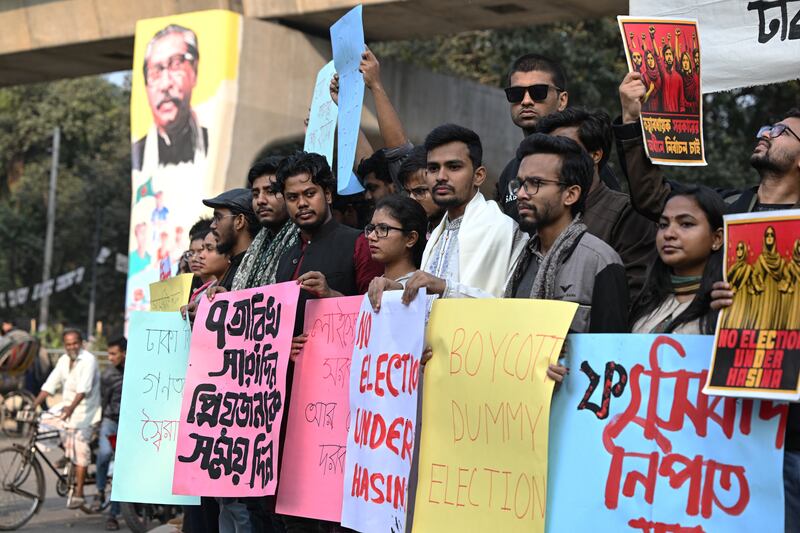
Tens of thousands of opposition leaders and activists – including the BNP’s secretary general and other top leaders – have reportedly been arrested since Oct. 28 alone, when the party staged the last in a series of rallies demanding a neutral caretaker government be put in place to oversee the polls.
At least 39 people – mostly from the opposition – have died in political violence since then.
‘No point’
Abdus Sattar, a resident of Dhaka’s Shaheenbag neighborhood, said he was not casting a ballot on Sunday because the election was uncompetitive.
“I came here to see how the vote is going,” Sattar told BenarNews. “I will not vote as there is no point. The ruling party is already the winner.”
But others took the opportunity to vote.
Kakoli Begum, 55, from the Dhaka-16 constituency, said voting was the only way to change the government.
“The election commission assured us that there would be fair polls. So I came here to vote,” she told BenarNews. “There is no violence, but the presence of voters is very thin.”
In recent months, the United States and other Western countries have ramped up calls to demand that free and fair elections be held in Bangladesh. Washington threatened visa restrictions on Bangladeshis whom it suspected of undermining the legitimacy of the vote.
But Hasina, the daughter of the country’s founding father, has largely ignored the pressure.
Since 2009, she has presided over a crackdown on dissent, notably against opposition parties and civil society.
Under her watch, local and international advocacy groups, including Human Rights Watch, have documented alleged abuses by Bangladesh authorities, including mass arbitrary arrests, enforced disappearance, torture, extrajudicial killings, and widespread repression.
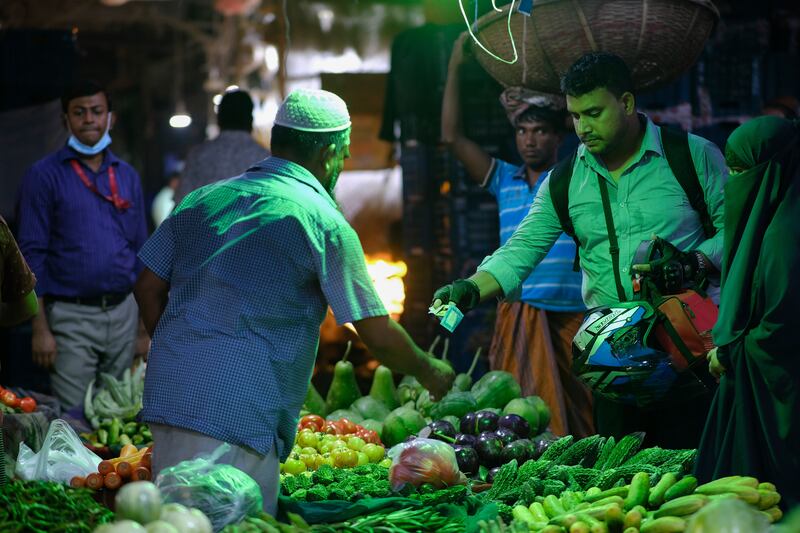
For many voters, the cost of living was a key concern. Food inflation has been stubbornly high in recent months, while power cuts and fuel-price hikes have added to consumer woes.
Until relatively recently, Hasina had presided over one of the region’s best-performing economies, largely on the back of the country’s booming textile and garment industry.
But Bangladesh's post-pandemic recovery stuttered, and it was forced to approach the International Monetary Fund for a bailout.
Sunday’s one-sided election sets the stage for more violence in the post-voting period because of growing discontent with the incumbent government and high inflation, the International Crisis Group said in a report on Thursday.
“For both political and economic reasons, Hasina doesn’t benefit from unrest and political violence. And responding with force could put her back in the possible crosshairs of Western sanctions.” Kugelman said.
This story covering Election Day in Bangladesh, has been updated various times with different images, from the opening of polls to their closure and the counting of results.

